Protests Erupt in Congo Demanding Release of Political Prisoners, Including Opposition Leaders

Mass protests erupted in Kinshasa, Congo, as hundreds demanded the release of political prisoners, notably three prominent opposition leaders accused of politically motivated charges. Protests reflect deep public dissatisfaction with President Tshisekedi’s administration amid ongoing human rights concerns and a history of political turmoil in the nation.
In a significant display of dissent, hundreds of individuals gathered in front of Congo’s highest court on September 25, 2024, to demand the release of political prisoners, including three leading opposition figures who are currently incarcerated under what their supporters assert are politically charged allegations. The protests in Kinshasa coincided with ongoing turmoil in Congo under the leadership of President Felix Tshisekedi, who has faced scrutiny following his contentious reelection in December 2023 amidst accusations of election irregularities. Participants in the protest displayed banners urging the authorities to “Release political prisoners,” and vocally criticized President Tshisekedi, with some chants expressing the sentiment, “Tshisekedi, you have killed our country!” Demonstrators also obstructed the entrance to the court. Following the event, representatives from multiple opposition parties delivered a formal statement to the Minister of Justice, accusing the president of suppressing dissent and undermining a government based on the rule of law. Included among those whose release was demanded were Jean-Marc Kabund, the leader of the Alliance for Change party, Mike Mukebayi, a former provincial parliamentarian, and Seth Kikuni, who was a candidate in the last presidential election. Kabund and Mukebayi were apprehended following accusations of “insulting the head of state” and disseminating false information, with Kabund receiving a seven-year sentence after alleging corruption within the government. They are being held at Makala Central Prison, a facility notorious for its overpopulation, housing more than 12,000 inmates despite a capacity of only 1,500. This month, a tragic jailbreak attempt resulted in the deaths of 129 individuals amid clashes with guards and a stampede in the overcrowded space. Kikuni was detained for “incitement of civil disobedience” earlier this month and is currently held by the national intelligence agency. The backdrop of these protests is further complicated by the Congolese government’s recent announcement of its intention to seek a position on the United Nations Human Rights Council, a move that has drawn harsh criticism from opposition parties and civil rights organizations. Critics argue that the country’s dismal human rights situation undermines its legitimacy to hold such a position.
The Democratic Republic of the Congo has a complex political landscape marked by instability and allegations of corruption. President Felix Tshisekedi’s administration has faced accusations of political suppression, particularly concerning opposition figures who are often detained under controversial circumstances. The high-profile arrests of opposition leaders have sparked widespread protests and calls for reform, underscoring the tensions between the government and those advocating for democratic principles. The Makala Central Prison, where many political prisoners are held, is known for its severe overcrowding and dire conditions, leading to human rights concerns that attract international scrutiny. The potential candidacy for the UN Human Rights Council highlights the irony of the Congolese government’s simultaneous efforts to engage with international human rights frameworks despite its internal issues.
The protests in Kinshasa reflect significant public discontent with the Congolese government’s treatment of political dissent and its handling of human rights issues. Activists and opposition representatives continue to call for the release of imprisoned leaders and advocate for democratic reform, while the government’s aspiration for a role in the UN Human Rights Council raises questions about its commitment to human rights. The situation remains precarious as political tensions persist in Congo, indicating ongoing struggles for democratic legitimacy and the rule of law.
Original Source: apnews.com







